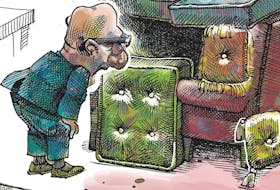As a political scientist, there are many reasons for liking many minority and coalition governments. But the best one for me is the insecurity that alters their behaviour.
Insecure governments think and behave differently than do confident majority governments. Government insecurity stimulates compromise, openness, transparency and accountability, not to mention productivity.
In contrast, majority government can foster arrogance in the context of a five-year parliament at the price of the public good.
Insecurity, which is sometimes described as "election jitters," changes the communication dynamic in parliament. Minority governments reach out to opposition parties and they in turn approach ministers and government members to negotiate their party's position. They lack a majority in the legislature but can stay in power by maintaining the confidence of the House of Commons.
They do this not by including members of other parties in their cabinet but by negotiating the support of opposition members to avoid defeat. However, coalition governments, quite common elsewhere in the parliamentary world, have been rare in Canada. They fill cabinet positions with the members of two or more other parties. Because of this, loyalty to the goals of the government can be tricky for obvious reasons.
In both of these types of government, the role of Party Whips and House Leaders becomes paramount in the operation of governments that lack majorities. They guide parliamentary committees, monitor attendance and organize bloc voting.
They guide the flow of party business among parties. MPs in all parties feel free to approach House Leaders and Whips to provide their opinions on the fate of government legislation. That in itself is a healthier legislative environment than in most majority parliaments.
But minority governments are prone to defeat. This is a weakness that diminishes their advantages and public respect. They are in the vulnerable position of having to negotiate their survival every day.
“… some of the best policies Canadians still enjoy came under minority governments.” -- Jim Guy, Political Insights
The average duration of a minority government in Canada is about one year, five months and five days. The longest lasting minority government was Canada's first minority, from 1921-1925. That was Mackenzie King's controversial government, described as an "off-again, on again, out again, in again, gone again, Finnegan – lifespan."
In all of Canada's parliamentary history only about 20 years have been governed under minority governments.
The shortest minority was John Diefenbaker's, lasting five months from 1957-58, dissolution without defeat. But another Diefenbaker government was, defeated after 10 months.
There have been 13 separate minority governments since 1921. The short lifespan of these governments has been their most serious shortcoming, at least in the minds-eye of the public. The public loses confidence, expecting strength from governments to maintain their durability.
Governments need to plan and direct public policy with some confidence that the process won't be interrupted by frequent elections. Constant electioneering is interruptive and considered annoying in the general public. So the goal among party officials is to avoid elections at all costs. For that reason, minority governments are in a constant campaign mode.
Elections are expensive theatre in Canada and usually resented by the general public. Election 2019 will cost Canadians some $500 million, up from $443 million in 2015 and $289 million in 2011. Think of the estimated cost to reconnect Cape Breton's rail line from Truro to Sydney at $115 million plus. Or building a fully operational Port facility in Sydney, still undergoing estimates.
But some of the best policies Canadians still enjoy came under minority governments. There is Medicare, the Canada Pension Plan, Canada Assistance Plan, Guaranteed Income Supplement for old-age pensioners, a new flag, the landmark gay marriage legislation under Paul Martin, and the Federal Accountability Act with its controls on campaign spending affecting this election.
So don't let the word "minority" diminish the efficacy of minority governments. The next minority might bring us better health care, pharmacare and sustained funding to attract new doctors. Medical schools need to come off of their self-inflated evaluations and provide growth in the graduation of people who want to be doctors. A minority government could kick-start the attitude change we need to move forward.
As a professor I have written supportive letters for many qualified students wanting admission to medical school, only to be denied year after year. Cape Breton students are highly competitive with students across the country. They possess all of the necessary skills to become admirable science and medical practitioners.
We need to reinvent the science programs of many of our universities here in the province to graduate more doctors of medicine. A minority government might have the moxi to ask why Nova Scotia, for example, has only one medical school with so many degree-granting institutions that could lock-step a pathway to graduating more doctors.
It is true that post-secondary education is a 'provincial responsibility.' But the federal government administers the health transfer which could be expanded to support medical schools and provincial training resources. The doctor shortage is everywhere in Canada.
We need a national strategy to grow the doctor population. It’s not rocket science, its medical science. It can't be done solely from a provincial perspective. It might be worth considering making all Canadian medical schools nationally funded or, better still, make them national institutions and move them out of the limitations of provincial government budgets. A minority government might be where this debate can take place.
Dr. Jim Guy, author and professor emeritus of political science cat Cape Breton University, can be reached for comment at [email protected]









